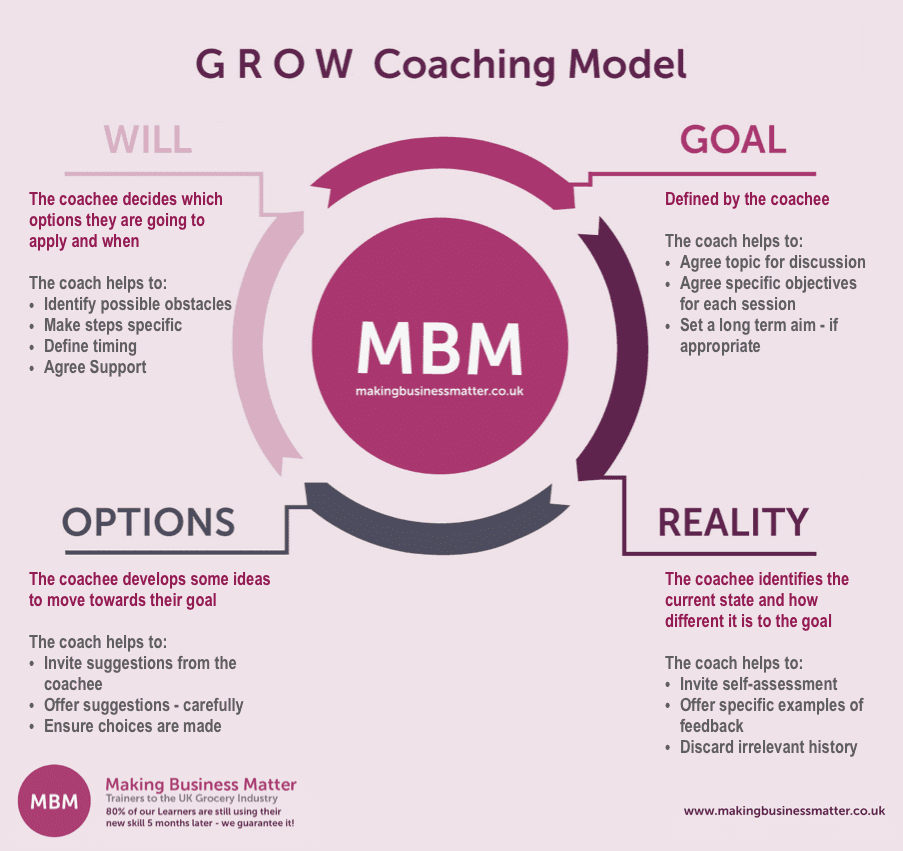Managers Need to Coach Their Teams, and They Need Coaching Too
Coaching for managers is important for businesses to put in place. All in all, it helps managers up their game, raise their skill levels, and develop professionally. And there’s more. Managers can also use coaching techniques to help their teams. Actually, it not only enables them to do their jobs better and have a better understanding of the business and the company’s overall goals but also makes them more likely to deliver the required results.
When money and time are in short supply, which is a reality for many businesses at present, coaching might seem a luxury you can do without. But if that’s what you feel, you’re missing a trick. Creating a ‘coaching culture’ benefits people at all levels in the company. And when done properly, it delivers a return way beyond the cost of what you invest in it. In fact, a MatrixGlobal study of Fortune 500 telecoms companies found executive coaching resulted in a 529% ROI.
Following on from that, it’s important to be clear from the outset that ‘managers,’ in a larger business, means both the senior managers in the business responsible for leadership and strategy, and the managers heading operational teams further down the hierarchy.
Quite simply, coaching techniques make managers at all levels more effective in connecting with their teams and inspiring them. Even more, doing this develops the team’s trust, and creates a more emotionally balanced working environment.

First Question – What Is Coaching in Management?
Firstly, the Massachusetts Institute of Technology (MIT) define coaching as ‘an ongoing approach to managing people which creates a motivating climate for performance, and improves the match between expected and actual attainment.’ Coaching, say MIT, increases the chances of individuals succeeding by giving them timely feedback, recognition, clarity, and support.
Coaching might not seem that relevant for managers leading teams in repetitive, task-based work, where it’s all about ‘command and control.’ If you’re leading a team like that, think about this. In your environment, a bit of coaching can help you identify people with promise because it enables you to:
- Gain a clearer picture of employees’ strengths and areas of opportunity for development.
- Increase team members’ communication skills, self-awareness, and emotional capability.
- Create a space for teams to experiment, make mistakes, learn, and grow.
Coaching like this, based on finding and developing people’s strengths and capabilities, and giving them the opportunity to do so, is particularly important when businesses are changing and you need to train staff in new routines and processes.
What Do Coaching for Managers’ Programmes Involve?
Now that’s another question when exploring coaching for managers. Leadership and management coaching programmes can involve various activities:
- One-to-one coaching.
- Coaching for teams.
- Coaching culture workshops to encourage and support managers in coaching their teams.
So we mentioned creating a ‘coaching culture.’ In a business, this means moving away from the traditional ‘command and control’ model to one which encourages independent working and responsibility at all levels. Clearly, managers still need to make decisions and give instructions, but in a ‘coaching culture’ they help individuals to arrive at their own solutions to problems and challenges and empower them to actively engage in change.
Here’s another important point to take on board. Coaching needn’t necessarily involve outside professionals, but it’s best if it happens away from the usual work environment, so people relax and concentrate on absorbing the learnings. Leaders or other managers can do the coaching, provided they have the expertise and, importantly, the people they’re coaching are open to them doing it.
The GROW Model in Coaching for Managers- a Great British Coaching Success Story
We’ll explore some American and Canadian ideas about coaching for managers in a moment. But before that, here’s a shout-out for the ‘GROW’ model. This is a Great British success that’s been used in corporate coaching since the late 1980s and adopted worldwide. Coaching with ‘GROW’ helps you and your people become the best possible versions of you. Along the way, ‘GROW’ also helps with important activities like goal setting and problem-solving, which are essential skills for managers.

Note the ‘GROW’ model plays a key part in Making Business Matter’s soft skills offering. Our ‘GROW’ and Advanced ‘GROW’ Coaching Cards confirm our expertise as soft skills training providers. We also offer Coaching Skills Training and Executive Coaching courses involving the ‘GROW’ model.
Sticky Learning ® is 7 times more effective than 1-day training courses. Plus, you will get a Chain of Evidence proving your Return on Investment. Discover soft skills training that changes behaviours long term.

The Importance of Coaching for Managers
Managers who develop and use their coaching skills are more likely to be supportive and help their people do better and build working relationships, rather than being critical when they struggle or make mistakes. Managers can also face difficulties in their work, and they too will benefit from coaching to improve their performance, by helping them focus on achieving their goals. Additionally, if it turns out that managers’ current jobs aren’t right for them, coaching can also help them move in new directions, either within the business or elsewhere.


>> Grow Coaching Cards <<
Important Question – Can a Leader Be a Coach?
The answer is, they can. Coaching is a recognised leadership style, defined by the leader’s ability to see individual team member’s strengths and weaknesses, so they can help each individual grow. The characteristics of a coaching leadership style include:
- Compassion
- Self-awareness
- Collaboration
- Encouragement
- Communication
Managers Need Coaching. Here’s the Evidence
In August 2019, before the pandemic, The Predictive Index, a Massachusetts-based company specialising in talent optimisation, conducted a survey asking employees from 13 industries about their managers. They found nearly 30% of them believed their manager lacked team-building skills. 18% said theirs lacked feedback skills, 10% said they lacked delegation skills, and 14% said they lacked time management skills. This supports the need for coaching for managers. Also, you can download The Predictive Index’s 2019 People Management Report at predictiveindex.com.
Coaching Pays Dividends
Delving deeper into coaching for managers, here are some more positive stats on the positive payoff businesses can get from coaching. In a Manchester Consulting Group study of Fortune 100 executives, coaching produced:
- An ROI of almost six times the programme cost.
- 48% improvement in work quality.
- 61% improvement in job satisfaction.
- 67% improvement in teamwork.
- And 77% improvement in work relationships.
That’s the Way to Do It – 10 Steps to Coaching Your Team
The Center for Management & Organisation Effectiveness (CMOE), in Sandy, Utah, helps businesses in over 60 countries grow and become more competitive by taking advantage of their hidden talent through coaching.
They suggest these 10 steps:

Step #1: Know Your Employees:
First of all, make a concerted effort to get to know your people on a deeper level. Specifically, learn about their strengths and weaknesses; what they excel at and what challenges them; what motivates them, and what they find discouraging. Along with formal personality testing, consider having your team members complete regular self-evaluations and use the results to ensure you’re using them in the most effective way possible.
Step #2: Foster Transparency:
Being open with your people helps build trust, form relationships, and ensure everyone’s on the same page. Transparency at the top of the hierarchy helps foster a culture of open communication. So begin by asking yourself these questions:
- How often do I open myself up to others and allow them to get to know me?
- Have I clearly explained my values and motivations to my team members?
- Am I clear and consistent in the way I make choices and decisions?
- Do I tell team members when I make a mistake or discover I don’t know something?
As with leadership or management generally, the best thing is not to expect your team members to do anything you wouldn’t. So lead by example.
Now, let’s look at some more of the Center’s steps for coaching for managers.
Step #3: Encourage Collaboration:
People are naturally competitive, and competition can bring energy to the workplace. Discourage unhealthy competition, promote collaboration, and recognise group achievements, and you’ll foster a culture that thrives as a team and inspires members to rely on each other.
Step #4: Create Clear Objectives and Goals:
First of all, this is virtually impossible without strategic planning. We mentioned the GROW model before. Now this is where that comes in. Start with ‘big picture’ thinking and encourage people to discuss and brainstorm ways to meet your longer-term goals. Also, draw on their individual strengths, and ask for their dedication, commitment, and creativity. After identifying your larger goals, develop a timeline including milestones and benchmarks to keep everyone accountable, and gauge the team’s cohesion and progress.
Step #5: Celebrate Success:
Marking milestones and benchmark goals is one of the best ways to keep your team on track, motivated, and inspired. In the process, celebrate people’s individual successes, as well as the team’s. Highlighting everything from work anniversaries and personal achievements to professional gains and wins is a powerful way to keep people motivated and boost morale.
Step #6: Build Mutual Trust:
Effective coaching relationships are based on balanced trust. Ways to do this include:
- Having an open-door policy.
- Being clear, friendly, and non-judgmental in coaching sessions.
- Making a conscious effort to show people you care about them, consider them valuable team members, and take a keen interest in their success.

Step #7: Pave the Way for Achievement:
You can’t expect your team to operate effectively, without doing the groundwork. So give them access to training, software, resources, strategies, materials, and whatever else they need to succeed in their roles – and if something’s lacking, fill the gap as quickly as possible.
Step #8: Share Constructive Feedback:
Now how you do this can make or break your team‘s success. What have they done well? What strategies haven’t worked? And what needs improving? Giving – and receiving – constructive feedback can be tricky. Craft your message carefully, work on your feedback skills, and be open to feedback from others.
Staying with this important element, feedback.
Step #9: As the Coach, Ask for Feedback on Your Input:
The best and most effective coaches are coachable themselves. During group meetings and one-on-ones, ask what you can improve in your role as coach to help them reach the performance and behaviour goals you’ve set together. They might point things out that you can do better, so keep an open mind, remain flexible, and maintain your perspective.
Step #10: Manage Inter-team Disputes:
However hard you try to build a unified, communicative team, there are bound to be conflicts. Whether it’s people not pulling their weight, or bullying individuals who are different, it’s down to you to keep an eye out for it. So get to the bottom of the conflict and fully understand the issues, and put procedures in place for dealing with, and avoiding, these problems in future.
A Simple Plan – Coaching by Numbers

Great coaches don’t see coaching as just one more thing on their “to-do” list. In fact, they look at every interaction as an opportunity to strengthen and develop their people. This is a crucial point on the topic of coaching for managers. So let’s look at some pointers from the experts, to help you put this into practice:
3 Core Plays to Develop People
- Clarity: Being clear about what constitutes high performance, and why it matters.
- Competence: Building the skills and confidence people need to move towards these expectations.
- Recognition: Acknowledging progress helps people grow, deliver results, and stay committed.
5 Key Coaching Skills for Leaders
- Listening: Listening well is a difficult skill to master. Read our article on Attentive Listening.
- Understanding people’s perspectives: Everyone’s different and has their own ‘filters’ which affect how they see things.
- Asking questions: Perhaps the most crucial part of coaching is asking the person you’re coaching questions. It engages them and pushes them to think smarter.
- Planning action: Identifying things to work on after the session.
- And being comfortable with failure: Recognising what’s working, and what isn’t.
5 Effective Coaching Techniques
1. Pre-session check-in and questionnaire:
First of all, help people prepare for the session and discover what they want to focus on, including things they didn’t cover in the last one. Identify what significant successes and problems they’ve had since the last time.
2. Breathing, or relaxation exercises:
Taking time to get centred and grounded at the start of a coaching session helps bring both the coach and the client into a present and focused state of mind, by establishing positive energy before you get into the material of the session.
3. Open-ended questioning:
Asking open-ended or “guiding” questions encourages self-reflection and invites the coachee to find the answers they’re seeking within themselves.
4. Follow-up for feedback:
One of the simplest and most productive techniques a coach can use is ongoing follow-up in between sessions. All in all, follow-up allows the coach to evaluate the effectiveness of the coaching, shows the client that the coach cares about their progress and wellbeing, and also aids in accountability.
5. Accountability:
In essence, making people accountable for their progress helps them reach their goals.
Speaking of which, an American Society of Training and Development study found making a commitment to someone that you’ll achieve your goal, reaches the target 95% of the time.
And Finally: Every Conversation Can Be a Coaching Session

Now let’s close off this topic of coaching for managers with action steps. You can turn every team conversation into a coaching experience, like this:
- Listening: Show a ‘positive regard’: Don’t interrupt, be still and present. And listen beyond the words, notice body language, and what people aren’t saying.
- Curiosity: Be interested. If you’re the boss, don’t be your usual commanding self, and instead ask open-ended questions.
- Lastly, mirroring: As you summarise the conversation, reflect back the person’s feelings, so they feel heard, understood, and grounded.
The executive chairman and CEO of Microsoft, Satya Nadella, uses a coaching leadership style to focus on the employees responsible for creating and maintaining Microsoft’s products and projects. And on his LinkedIn profile, he says ‘I define my mission and that of my company as empowering every person and every organisation on the planet to achieve more.’ Now you can’t be much more of a coach than that.
All in all, whatever kind of business you’re running, whatever the activity, try treating your people as human beings and doing a bit of coaching, and you’ll find they work better, and your company does better as a result.
Lastly, interested in learning how MBM’s coaching can benefit your organisation and its managers? Then contact us today.




